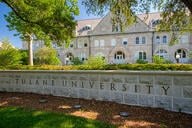You have /5 articles left.
Sign up for a free account or log in.
Representative Lamar Smith may be among the least popular members of Congress with social scientists. As chair of the House science committee, the Texas Republican has pushed legislation that would result in significantly lower funding levels for social science research supported by the National Science Foundation, and he has repeatedly questioned grants in social science disciplines.
Smith's popularity isn't going up with a new bill on the NSF, which advocates for the social sciences say is a deliberate attempt to make it more difficult for scholars to win grants and seeks to change the definition of basic research.
The legislation would require that "each NSF public announcement of a grant award be accompanied by a non-technical explanation of the project’s scientific merits and how it serves the national interest."
In a statement Representative Smith released about the bill, he said it was needed to prevent grants he described as wasteful.
“We must set funding priorities that ensure America remains first in the global marketplace of basic research and technological innovation, while preventing misuse of Americans’ hard-earned tax dollars. Unfortunately, in the past NSF has funded too many questionable research grants -- money that should have gone to projects in the national interest," he said. "For example, how does the federal government justify spending $220,000 to study animal photos in National Geographic? Or $50,000 to study lawsuits in Peru from 1600-1700? Federal research agencies have an obligation to explain to American taxpayers why their money is being used on such research instead of on more worthy projects."
The Consortium of Social Science Associations on Friday issued a statement criticizing the legislation and Representative Smith's rhetoric. The consortium has repeatedly criticized the tactic of members of Congress singling out research grants and implying that politicians can judge them. And the new statement does this again, saying that the "ongoing mischaracterization of meritorious research projects illustrates the intent of some to continue inserting political review into the NSF grant-making process."
And the statement goes on to say that the value of basic research can't be judged, grant by grant, at the time a project starts. "The nature of basic science is to explore fundamental questions that may not have an immediate application but that contribute to the scaffolding of knowledge that builds and progresses over time. This necessary, unending pursuit of new knowledge is what is in the national interest."
The American Anthropological Association also issued a statement expressing concern about the bill.
"We are mindful that researchers must be accountable for the federal dollars that support us. We also believe, however, that it is ill-advised for Congress to exert political pressure and impose a 'selection of science' based on something other than scientific merit," the statement says. "Anthropological research serves the national interest by helping achieve a more just and sustainable society, and the need for such research has never been greater. Because of the work of anthropologists, heritage and languages are preserved, school systems are improved, lives are saved through public health interventions, environmental resources are managed more effectively, and a culture of innovation is better understood. These important contributions are only possible when researchers are able to pursue open-ended inquiry and held accountable for rigorous consideration of ideas through the self -correcting mechanisms of scholarly exchange, peer review, and the like."
As word has spread about the bill, social scientists have taken to social media to criticize it. Ed Liebow, executive director of the American Anthropological Association, wrote on Twitter: "Watch out for this - Rep. Smith tells NSF what is science in the 'national interest.' " And from Britain, Kieron Flanagan, senior lecturer in science and technology policy at the University of Manchester, tweeted: "US Rep. Lamar Smith - still trying to dismantle world’s strongest science system."




